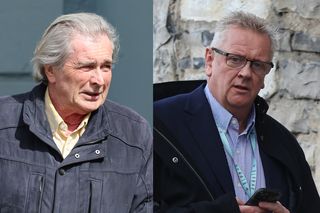Microsoft leader's new world outlook
Brad Smith, president of the tech giant, tells Adrian Weckler that rural broadband is crucial for Ireland, and says the digital revolution now needs checks and balances
‘In the tech sector, people want to drive quickly. But driving quickly without guardrails is a recipe for danger,’ says Brad Smith. Photo: Naoise Culhane Photography
'Bill Gates, Satya Nadella and Brad Smith walk into an Irish bar…' It sounds like the start of a corny tech nerd joke. But it's precisely what happened last week in Dublin. Microsoft's very top brass - from founder Gates and CEO Nadella to chairman John Thompson and president Smith - all convened in Ireland's capital for a board meeting.
There was no special cultural or seasonal reason. Instead, it was because Dublin now sits alongside Seattle, San Francisco and a handful of other cities around the world as a tech destination of note.
"It was business," Smith told the Sunday Independent in an exclusive interview afterwards.
"It made sense to bring our board of directors to Ireland, given the role that technology plays here and given the importance of Ireland to Microsoft."
Smith, the 60-year-old long time legal adviser to successive CEOs of Microsoft from Bill Gates to Satya Nadella today, knows Ireland like few other global tech executives do.
He has negotiated seminal deals for the company here, all the while seeing Ireland grow from being an impoverished tech wannabe to one of the major data brokers in the world.
But it's been a long journey.
His new book, Tools And Weapons, co-authored with Carol Ann Browne, includes an anecdote about how the Irish government in the 1990s convinced him and Microsoft to build its first European data centre here.
"I had explained that it just wasn't feasible for us to build our first European data centre in Ireland," he says in a chapter about privacy. "There was no high-speed fibre-optic cable connecting Ireland to the European mainland and, without that, a data centre dimply didn't make sense."
The government, "masterfully", he claims, said "give us three months".
"Three months later, the Irish government had negotiated a contract for precisely the type of cable needed," he writes. "And we were on our way to building a data centre south of Dublin. Then we added more. Today we have data centres in other countries across Europe, but none is as large as our data centre campus in Ireland. It fills two square miles. Together with the large data centres run by Amazon, Google and Facebook, it has helped turn Ireland from a small island into a data superpower."
Now, Smith says, Ireland is a primary global player, looked to by others for infrastructure.
"As I commented to officials while visiting nations in the Middle East, Ireland is to data what Switzerland is to money," says Smith.
Even still, he says, there's more to be done. Rural broadband is something he takes a particular interest in. He warns that if Ireland doesn't succeed in connecting the million or so people struggling without modern communications infrastructure, those areas could pay a heavy economic price.
"If a rural community doesn't have access to broadband, it makes it extraordinarily difficult to attract new jobs," he says. "It even makes it difficult to sustain the jobs that are there. And it makes it impossible to take advantage of advances for everything from healthcare to education. It's really important that Ireland gets the benefit of this, with roughly a million people in those areas. It's critical to close the gap with the parts of Ireland that don't have broadband."
A lack of broadband, he says, leads to alienation, resentment and a feeling of being left behind by the better-off parts of society.
"You cannot sustain a healthy democracy if there are major groups of people who feel they are being left behind," he says.
"One of the things we find repeatedly is communities that don't have broadband feel left behind, because they are, especially when it comes to job growth and economic growth. And you can even see a correlation between that and communities that want their nation to turn inward."
In an era of Brexit and Trump-fuelled populism, it's hard to argue with this point.
The correlation between technology and societal problems is a core theme of his book. A good deal of today's tech innovations, he says, now are being weaponised and used against civil society.
Aside from the obvious issues around social media and elections, Smith looks at the problems and ethics around new technologies such as facial recognition and artificial intelligence.
Microsoft, he says, has developed a growing list of principles that prevents it from selling sensitive services - such as facial recognition - to regimes without proper due process. But it does this voluntarily. It should be doing it as part of a broader regulatory move. In other words, the tech world needs to start applying GDPR-style ethical sensibilities to every part of rollout and development.
"I'd put it like this," he says, sniffing a coloured Microsoft marzipan cupcake that the Merrion Hotel laid on as a frill.
"The faster you drive down the highway, the more you should want to see guardrails on the road. In the tech sector, people want to drive quickly. But driving quickly without guardrails is a recipe for danger. And If we look around the world today, the road conditions in tech look rather perilous."
Those 'guardrails', he says, should come in the form of firm, thoughtful regulation.
"We see threats to privacy, the weaponisation of code with cyber attacks and other forms of cyber threats to democracy. It's everything from AI creating concerns about facial recognition to the impact on jobs and the economy. So to look at all this and say 'we don't need any guardrails, we just need to move fast', is no longer a recipe for success."
One of the world's most senior technology executives arguing for more regulation on his industry is a little atypical. Then again, Smith has been emerging as the conscience of the global tech industry for some time.
A lawyer who grew up in the mid-western state of Wisconsin, in this part of the world he has recently seen most prominence through Microsoft's challenge to US attempts at accessing private emails on Microsoft servers located in Ireland.
While that case faded away last year due to an intervening act of Congress, the defiance of US authorities earned Smith kudos as something of a privacy advocate. (In this capacity, he joins Apple's Tim Cook, who also successfully stood eye-to-eye against US orders to divulge private user data on an iPhone used by a criminal.)
For seasoned readers, Microsoft as the voice of industry moderation might still seem like a little ironic.
The Seattle-based firm, which employs some 2,100 people in Dublin's Sandyford, was the original monopolistic bad guy among software companies in the 1990s. Bill Gates's firm crushed opposition for years, especially in the all-important web browser market. This ultimately led to massive regulatory intervention on both sides of the Atlantic and a generation of bad will among a chunk of the tech industry.
Smith was there for most of it. He admits that both he and Microsoft made lots of mistakes. But he thinks that the company and the wider industry can take some of the lessons from that era into today.
That specifically applies, he says, to the question of whether tech goliaths are becoming too big and need to be broken up. This is a growing call among sections of civic policy-makers. Elizabeth Warren, one of the two front-running Democratic presidential candidates, has made it a plank of her manifesto.
The argument such advocates make is that companies like Google and Facebook - and perhaps Microsoft and Amazon, too - have too much control over crucial gateways like information access or communications. Or even if they don't have monopolies in any particular sector, like Google does with search, the sum of their parts makes for a potentially troublesome competitive landscape with cross-promotion (a specialty of Amazon's). Like the Bell telecoms breakup in the early 1980s, a split might create more equitable conditions, the argument goes. Isn't there merit to this?
"One can certainly think in those terms," says Smith. "But I think that there's a lot to be learned from the Microsoft case. The [US] government did go down the path of wanting to break up Microsoft. In fact, they secured a court order, which was later reversed. But ultimately they realised that they could address the problems that bothered them.
"So by taking steps other than pursuing a breakout specifically, they put in place rules to govern Windows, which protected against Microsoft using its economic position in Windows to gain undue advantage.
"That was done to ensure that there would be a healthy browser market, independent of Windows. And today, there is a healthy browser market. The government didn't need to break up the company.
Smith says that he wants his book to be a manifesto for solutions for regulators and tech founders.
"Think of now as the first day of the 2020s," he says. "We have a decade ahead. What are we going to need if we want to move fast? Our argument is that you need guardrails. You need to have the trust of the public and that's not just in a single company, it's in technology as a whole.
"When we look at automobiles, airplanes, groceries, food and pharmaceutical products, there are regulatory safeguards for all of them. And the public is better because of it. I think the question, in some ways should become not whether regulation should be in place for digital technology, but rather, why not?"
Join the Irish Independent WhatsApp channel
Stay up to date with all the latest news














